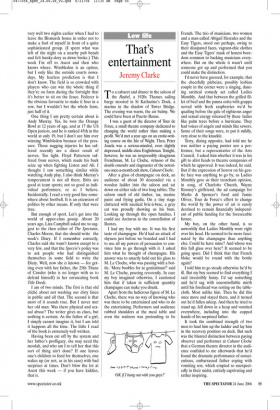That’s entertainment
Jeremy Clarke
To a cabaret and dinner in the saloon of the Raybel, a 1920s Thames sailing barge moored in St Katharine’s Dock, a marina in the shadow of Tower Bridge. The evening was warm, the air balmy. We could have been at Puerto Banus.
I was a guest of the director of Tour de Force, a small theatre company dedicated to changing the world rather than making a profit. We’d met a year ago on an erotic-writing course on the Isle of Wight. Then, Peter Joucla was a serious-minded, even slightly depressed, middle-class Englishman. Tonight, however, he was an irrepressibly oleaginous Frenchman, M. Le Cloche, virtuoso of the double entendre and ringmaster of the notorious once-a-month cult show, Cabaret Cloche.
After a glass of champagne on deck, an audience of about 30 descended via a wooden ladder into the saloon and sat down on either side of two long tables. The saloon smelt of old timber, tar, marine paint and frying garlic. On a tiny stage cluttered with nautical bric-à-brac, a grey cat was proudly showing us his bum. Looking up through the open hatches, I could see Arcturus in the constellation of Bootes.
I had my boy with me. It was his first taste of champagne. He’d had an attack of shyness just before we boarded and I had to use all my powers of persuasion to convince him to go through with it. I asked him what he thought of champagne. His answer was to smartly hold out his glass to M. Le Cloche, who was passing with a bottle. ‘More boobles for ze genitalman?’ said M. Le Cloche, pouring reverently. In case my boy imagined otherwise, I cautioned him that if taken in sufficient quantity champagne can make you drunk.
Apart from the ludicrous figure of M. Le Cloche, there was no way of knowing who was there to be entertained and who to do the entertaining. Performers and audience rubbed shoulders at the meal table and even the waitress was pretending to be French. The trio of musicians, two women and a man called Abigail Hercules and the Easy Tigers, stood out perhaps, owing to their dissipated faces, vagrant-chic clothes and the Easy Tigers’ mask of honest boredom common to backing musicians everywhere. But on the whole it wasn’t until someone got up and performed that you could make the distinction.
I’d never have guessed, for example, that the cheerfully plebeian, possibly lesbian couple in the corner were a singing, dancing satirical comedy act called Ladies Monthly. And that between the grilled fillet of beef and the panna cotta with grappa served with fresh raspberries we’d be quailing before the gale of righteous anger and sexual energy released by these ladies like palm trees before a hurricane. They had voices of angels and minds like sewers. Some of their songs were, to put it mildly, very close to the knuckle.
Terry, dining opposite, had told me he was neither a paying punter nor a performer, but a representative of the Arts Council. I asked him whether it was in his gift to allot funds to theatre companies of which he approved. It was indeed, he said. But if the expression of horror on his gentle face was anything to go by, as Ladies Monthly gave us their trenchant opinion, in song, of Charlotte Church, Wayne Rooney’s girlfriend, the ad campaign for Marks & Spencer’s food and Jamie Oliver, Tour de Force’s effort to change the world by the power of art is surely destined to remain financially independent of public funding for the foreseeable future.
My boy, on the other hand, is so unworldly that Ladies Monthly went right over his head. He seemed to be more fascinated by the champagne than anything else. Could he have mine? And whose was this full glass over here? It seemed to be going spare. Did I think that that French bloke would be round with the bottle again?
I told him to go steady otherwise he’d be ill. But my boy seemed to find everything I said irresistibly funny. I’d say something and he’d sag with uncontrollable mirth until his forehead was resting on the tablecloth. Most unlike him. Then he did this once more and stayed there, and it turned out he’d fallen asleep. And then he tried to stand up, fell down in a heap and vomited everywhere, including into the cupped hands of his surprised father.
It took the combined strength of two men to haul him up the ladder and lay him in the recovery position on deck. But such was the blurred distinction between paying observer and performer at Cabaret Cloche that a German theatre director in the audience confided to me afterwards that he’d found the dramatic performance of conscientious, embarrassed father coping with vomiting son, which erupted so unexpectedly in their midst, entirely captivating and rather inspiring.



















































 Previous page
Previous page